Caring, Coping and Coronavirus

Sky's Alex Crawford does an excellent job of speaking up for the thousands of residential care homes across the country who have been looking after some of the most vulnerable people in society during this terrible Coronavirus pandemic.
My mother spent her last days in a residential care home where she was treated with great kindness and compassion by all of the staff who helped her cope with the debilitating effects of Alzheimer's disease.
The official advice on Protective Personal Equipment (PPE) is still clearly an issue with staff in the residential care sector, as it is with staff in the home care sector where local councils are the major employer.
https://news.sky.com/story/coronavirus-why-care-homes-are-the-scandal-among-scandals-during-this-pandemic-11971795
Coronavirus: What's happening in UK care homes right now is a scandal our grandchildren will ask about
Once COVID-19 seeps into care homes, it is a monumentally difficult job to protect the residents, writes Sky's Alex Crawford.

By Alex Crawford - Sky News
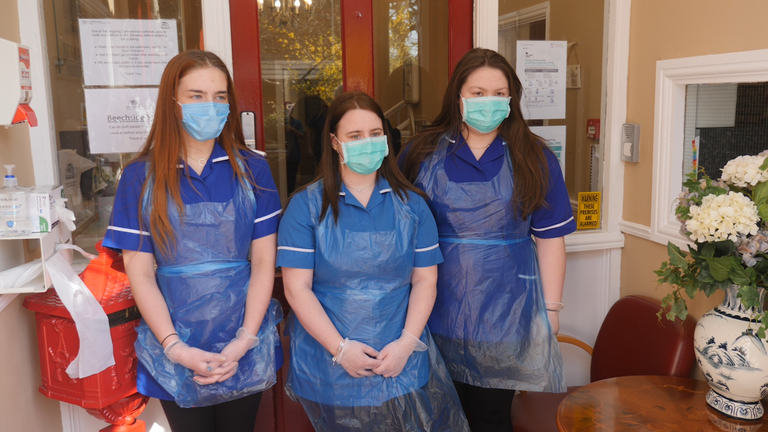
Inside care homes struggling with COVID-19
The scandal among scandals during this pandemic is the care home structure in Britain.
We will look back at this appalling, tragic episode in our global history, and our children and grandchildren will ask us: "Did that really happen? Did you really leave the most vulnerable of our society - the elderly, the infirm, the defenceless, the muddled, sick and weak - in care homes, shut away from their closest relatives? Did you leave them to be ravaged by a deadly virus, and do very little to help them?"
Because that is what's happening right now. There are elderly people - many with Alzheimer's, many with dementia, many frail - in thousands of residential homes up and down Britain, and they are very much at risk.
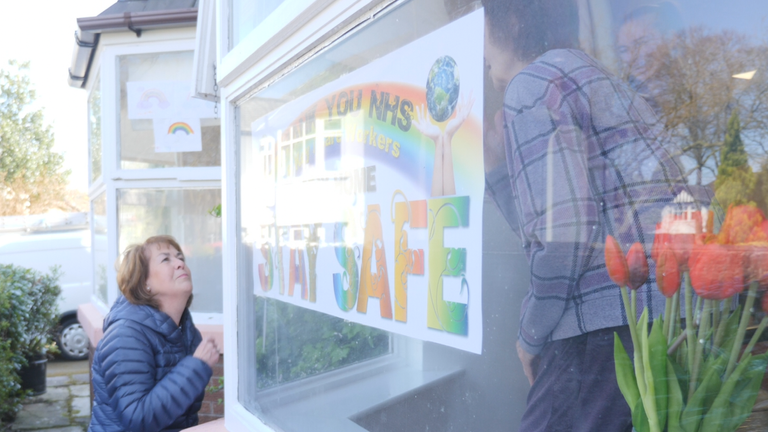
Image:The elderly and vulnerable in care homes can no longer be visited by their loved ones
Once COVID-19 seeps into these homes, it is a monumentally difficult job to protect the residents inside. The respiratory disease attacks the lungs, making it difficult to breathe.
We're told by the experts that it hits those with underlying conditions worst. That has become a catch-all phrase that means most of us believe it couldn't possibly apply to us or anyone we know or love.
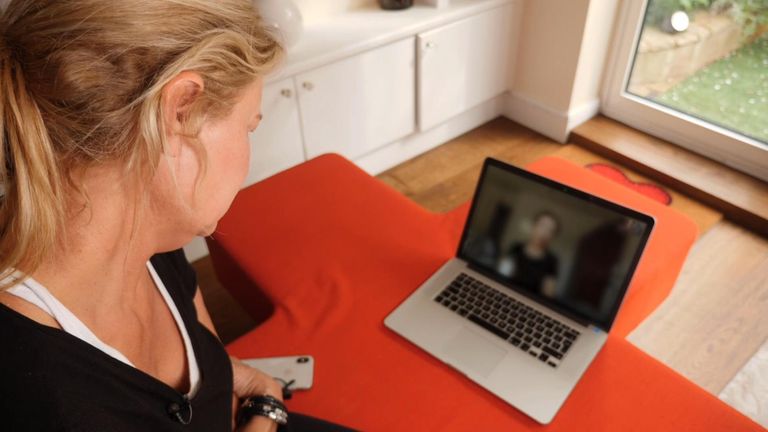
A care assistant working at a home with the COVID-19 outbreak tells Sky News that the experience is
And yet it does. It basically covers everybody.
I've interviewed fit men in their 30s who have collapsed after they have done their training runs. I've spoken to the children of medical directors who're still working beyond retirement, nurses with young children, and pensioners. They are all susceptible to this disease.
So imagine if you are in a residential home. A residential home is not a nursing home.
You're not sick. You're just elderly. You just need a little bit more support - a little bit more help getting up out of bed in the morning, preparing your meals, getting bathed, going to the bathroom, being helped down the stairs.

Once COVID-19 seeps into these homes, it is a monumentally difficult job to protect the residents inside. The respiratory disease attacks the lungs, making it difficult to breathe.
We're told by the experts that it hits those with underlying conditions worst. That has become a catch-all phrase that means most of us believe it couldn't possibly apply to us or anyone we know or love.

A care assistant working at a home with the COVID-19 outbreak tells Sky News that the experience is
And yet it does. It basically covers everybody.
I've interviewed fit men in their 30s who have collapsed after they have done their training runs. I've spoken to the children of medical directors who're still working beyond retirement, nurses with young children, and pensioners. They are all susceptible to this disease.
So imagine if you are in a residential home. A residential home is not a nursing home.
You're not sick. You're just elderly. You just need a little bit more support - a little bit more help getting up out of bed in the morning, preparing your meals, getting bathed, going to the bathroom, being helped down the stairs.

Image:Care homes are a tactile environment with frequent hugs, touches and kisses on the cheek
You may have some dementia. You may not. But you have company every day. There are always people around you and there are care assistants who will help you brush your hair, scoop the soup up to your mouth and read the newspaper.
These care assistants are not medically trained. They are not nurses. But if you are feeling ill, they will call the GP or community nurse to come and check on you.
There is always help at hand. It gives you security. It is safety in your old age. You don't worry about break-ins. You don't worry about meals. You don't worry about cleaning.
And then there's a worldwide pandemic, and your care home is infected. You can't go out. Your relatives can't come in but the virus just sweeps through the home - and one by one, the residents get sick.
But even still, after a lifetime of working and caring for others, the ones you care for most can't come and say goodbye to you as you get sicker and sicker and you finally breathe your last breath.
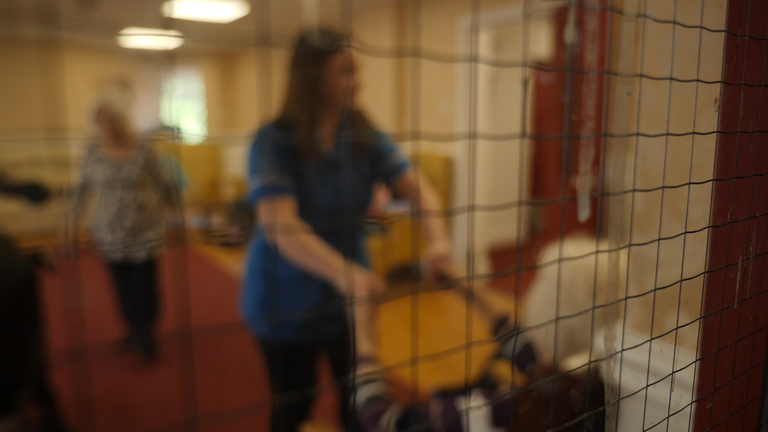
You may have some dementia. You may not. But you have company every day. There are always people around you and there are care assistants who will help you brush your hair, scoop the soup up to your mouth and read the newspaper.
These care assistants are not medically trained. They are not nurses. But if you are feeling ill, they will call the GP or community nurse to come and check on you.
There is always help at hand. It gives you security. It is safety in your old age. You don't worry about break-ins. You don't worry about meals. You don't worry about cleaning.
And then there's a worldwide pandemic, and your care home is infected. You can't go out. Your relatives can't come in but the virus just sweeps through the home - and one by one, the residents get sick.
But even still, after a lifetime of working and caring for others, the ones you care for most can't come and say goodbye to you as you get sicker and sicker and you finally breathe your last breath.

Image:Once COVID-19 seeps in, it is a monumentally difficult job to protect the residents inside
The coronavirus has changed everything - and it's exposed the very weak lines in our social care structure.
The care assistants are low paid, and they are generally working long days on zero-hour contracts.
One told us: "We are treated like second-class citizens. We think the NHS staff are privileged in comparison.
"If I ring in sick, they ask me: 'Are you too sick to work? Can you still come in anyway because we're really short-staffed?'
"I have no idea if we've got the right PPE (protective personal equipment). All I see is that it is very different from what I see on the news."
These are the people who are caring for our elderly men and women - those who have spent their whole lives contributing to society.
Their devotion to the residents and duty to care is often beyond question. We saw some inspiring sacrifice.
At Beechside Home in Liverpool, the care assistants have moved out of their family homes and moved into the care home to stop the virus getting inside. They didn't want to run the risk of bringing COVID-19 in and infecting the residents.
As care assistant Chloe Williams told us: "They are our family in the end and we'd want anyone to do the same for ours.
"There are people in this home that have been in the war. They've been midwives and social workers… they fought for our country and this is us fighting for them… we're paying them back for what they have done for us."
There are terrible statistics about the numbers dying in the country's residential care homes. Outbreaks of the virus in a closed community like a care home are fantastically difficult to control.
The coronavirus has changed everything - and it's exposed the very weak lines in our social care structure.
The care assistants are low paid, and they are generally working long days on zero-hour contracts.
One told us: "We are treated like second-class citizens. We think the NHS staff are privileged in comparison.
"If I ring in sick, they ask me: 'Are you too sick to work? Can you still come in anyway because we're really short-staffed?'
"I have no idea if we've got the right PPE (protective personal equipment). All I see is that it is very different from what I see on the news."
These are the people who are caring for our elderly men and women - those who have spent their whole lives contributing to society.
Their devotion to the residents and duty to care is often beyond question. We saw some inspiring sacrifice.
At Beechside Home in Liverpool, the care assistants have moved out of their family homes and moved into the care home to stop the virus getting inside. They didn't want to run the risk of bringing COVID-19 in and infecting the residents.
As care assistant Chloe Williams told us: "They are our family in the end and we'd want anyone to do the same for ours.
"There are people in this home that have been in the war. They've been midwives and social workers… they fought for our country and this is us fighting for them… we're paying them back for what they have done for us."
There are terrible statistics about the numbers dying in the country's residential care homes. Outbreaks of the virus in a closed community like a care home are fantastically difficult to control.

The environment is a highly tactile one. At Beechside, the care assistants spent the afternoon dancing with the residents and holding their hands. There were frequent hugs, touches, kisses on the cheek. This is what makes them special. This is what makes the residents smile.
But it also makes it one of the most susceptible places for the virus to replenish and multiply if it gets inside.
They have taken drastic measures by moving the care assistants inside. Most of those we talked to played it down - saying it seemed the most natural thing in the world for them to do. So far it has worked, but for how long?
Halfway through the afternoon, there was a call. A nearby home needed masks. Could they help? Beechside had managed to procure a comfortable amount of PPE for their staff - masks, gloves and plastic pinnies. These are probably not enough if there's an outbreak, but the minimum amount and in accordance with NHS England guidelines.
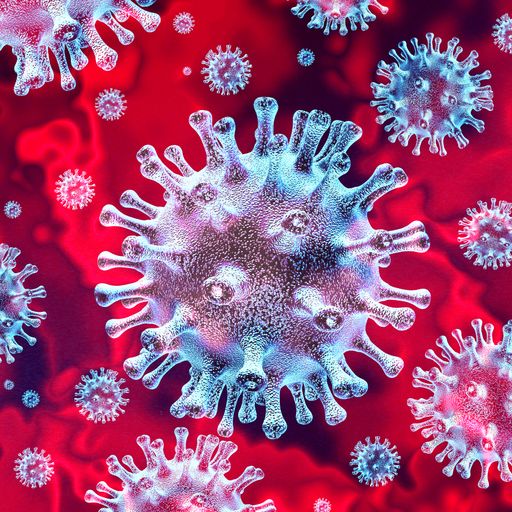
Coronavirus: Infection numbers in real time
The home around the corner that is asking for help is Oak Springs - a care home that is suffering an outbreak and has had 14 deaths in the last fortnight.
Only two who were taken to hospital have actually been tested, and both were positive. But there are few in the home who believe it is anything other than COVID-19 that has hastened their deaths.
The home and all who work inside are distraught. The manager herself is now ill with symptoms, but she told us before she went sick that "they were battling on" and she couldn't praise her staff highly enough. "They're under great strain," she said.
One relative who wanted to be anonymous and whose grandmother is inside the home likened the outbreak to a fire. "It felt like my nan was at that burning building and it was difficult to get a response to it… and as I said all along, the only difference with this is that you just can't see the fire: the fire is a virus."
There is much controversy over how these outbreaks are dealt with. There are considerable problems moving elderly people out of environments they are familiar with and into strange ones. It can often be more detrimental than advantageous.
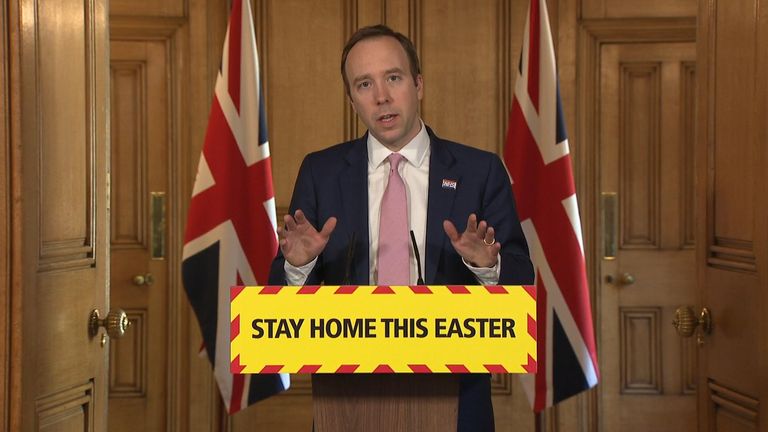
Hancock: 'Stay home however warm the weather'
But the local MP believes the time has come to radically think how to deal with the most vulnerable in our society. The elderly cannot be just left to perish, insists Paula Barker, MP for Liverpool Waverley.
"Everybody's life should be valued equally," she said. "I don't care whether you're 108 or if you're 10… your life is as valuable when you are young as when you are old.
"They've all contributed to society… these people deserve the optimum chance of survival and we've got to do everything in our power to ensure that they are safeguarded."
Caring and Compassion (10/04/20)

As a counterpoint to yesterday's blog about anonymous critics complaining about a care home in Glasgow helping a dying man's wife to visit her husband - here's an uplifting story from The Times which reports on hospital staff doing exactly the same thing.
I take my hat off to all the care staff and nursing staff involved because they did the right thing in refusing to listen to the naysayers and anonymous, armchair critics.
CORONAVIRUS
Coronavirus victims: ‘Doctors gave us ten minutes . . . we just told him that we loved him’
Sue Martin with her husband, Mal, who was taken to intensive care last month

Sue Martin with her husband, Mal, who was taken to intensive care last month
By David Brown - The Times
A woman has told of the heartbreaking moment that she and her teenage children, wearing full protective clothing, gathered at an intensive care bed to say goodbye to her husband, who has Covid-19.
Sue Martin, 49, a civil servant, begged to be allowed to visit her husband, Mal, 58, for a final time.
“We had to be in full protective gear. We weren’t allowed to touch him but we could speak to him. Essentially we were going in to say our goodbyes,” she said.
Mrs Martin told their children Hana, 16, and William, 13, that it was a personal choice whether they visited their father, with no right or wrong answer. Both wanted to see him as they had been unable to hug him before he left for hospital because of his infection.
“They let us have ten minutes with him. It was like he was just asleep. He had so many tubes and wires in him,” Mrs Martin told Today on BBC Radio 4. “We just told him that we loved him and it was heartbreaking to hear the children tell him they were going to make him proud. We were really glad to have that time with him.”
She had been told by doctors that Mr Martin, the chairman of a recruitment company in Cardiff, had “zero chance” of surviving. Yesterday he was still “holding on to life”, offering the family a “glimmer” of hope.
He became unwell a day before Boris Johnson announced the lockdown. He initially only had cold-like symptoms but by the following morning could not get out of bed and had a temperature of 38.8C. While he was self-isolating in the family home his wife tried to contact the NHS’s 111 service but was cut off each time after being left on hold for 82 minutes.
Ten days after the first symptoms emerged, Mr Martin’s breathing became rapid and he was taken to hospital. His wife assumed it would be a brief stay to give him oxygen but hours later she was told he had been put on a ventilator and that there was a 50 per cent chance he would die.
The family used Facetime to speak to him in hospital while he wore an oxygen mask and struggled for breath. “We just told him how much we loved him and I said how much I was really sorry that we hadn’t sent him in earlier,” Mrs Martin said. “He promised he would fight it. He said to my daughter, ‘Don’t worry, I’m going to be around a while yet and be here for your wedding and for you both growing up and see William play rugby for Wales’.”
Mr Martin has type 2 diabetes and suffered a heart attack four years ago, but otherwise he has had a “very healthy” life, his wife said.
The couple, who married in 1996, have exchanged text messages since he was hospitalised. “He said it wasn’t his time, that he missed me too much and that he was coming home,” she said.
When doctors tried to wean Mr Martin off the ventilator he deteriorated further. His kidneys failed and he was placed on a dialysis machine.
“They were giving him a maximum level of adrenaline to keep his blood pressure high enough to pump his blood round to his organs, and said that he was on the brink, and that they couldn’t do anything more for him,” Mrs Martin said. “I’m so, so grateful for all the hospital are trying to do for him, risking their lives to try to save his. They have been wonderfully supportive, compassionate and empathetic in such difficult times.”
On Sunday, a week after Mr Martin had been admitted, his wife was called by doctors to say there “was almost zero chance he was going to survive”. A nurse said that she would stay after her shift had ended so the family could make a final visit.
“We fully expected Monday to be his last day,” Mrs Martin said. “And then Monday, miraculously, the consultant said there had been a slight improvement.”
She added that the doctors made it clear he was still “extremely, desperately ill” and that there was almost no chance of him recovering, but she had not given up hope that “just maybe, he might turn a corner”.
A woman has told of the heartbreaking moment that she and her teenage children, wearing full protective clothing, gathered at an intensive care bed to say goodbye to her husband, who has Covid-19.
Sue Martin, 49, a civil servant, begged to be allowed to visit her husband, Mal, 58, for a final time.
“We had to be in full protective gear. We weren’t allowed to touch him but we could speak to him. Essentially we were going in to say our goodbyes,” she said.
Mrs Martin told their children Hana, 16, and William, 13, that it was a personal choice whether they visited their father, with no right or wrong answer. Both wanted to see him as they had been unable to hug him before he left for hospital because of his infection.
“They let us have ten minutes with him. It was like he was just asleep. He had so many tubes and wires in him,” Mrs Martin told Today on BBC Radio 4. “We just told him that we loved him and it was heartbreaking to hear the children tell him they were going to make him proud. We were really glad to have that time with him.”
She had been told by doctors that Mr Martin, the chairman of a recruitment company in Cardiff, had “zero chance” of surviving. Yesterday he was still “holding on to life”, offering the family a “glimmer” of hope.
He became unwell a day before Boris Johnson announced the lockdown. He initially only had cold-like symptoms but by the following morning could not get out of bed and had a temperature of 38.8C. While he was self-isolating in the family home his wife tried to contact the NHS’s 111 service but was cut off each time after being left on hold for 82 minutes.
Ten days after the first symptoms emerged, Mr Martin’s breathing became rapid and he was taken to hospital. His wife assumed it would be a brief stay to give him oxygen but hours later she was told he had been put on a ventilator and that there was a 50 per cent chance he would die.
The family used Facetime to speak to him in hospital while he wore an oxygen mask and struggled for breath. “We just told him how much we loved him and I said how much I was really sorry that we hadn’t sent him in earlier,” Mrs Martin said. “He promised he would fight it. He said to my daughter, ‘Don’t worry, I’m going to be around a while yet and be here for your wedding and for you both growing up and see William play rugby for Wales’.”
Mr Martin has type 2 diabetes and suffered a heart attack four years ago, but otherwise he has had a “very healthy” life, his wife said.
The couple, who married in 1996, have exchanged text messages since he was hospitalised. “He said it wasn’t his time, that he missed me too much and that he was coming home,” she said.
When doctors tried to wean Mr Martin off the ventilator he deteriorated further. His kidneys failed and he was placed on a dialysis machine.
“They were giving him a maximum level of adrenaline to keep his blood pressure high enough to pump his blood round to his organs, and said that he was on the brink, and that they couldn’t do anything more for him,” Mrs Martin said. “I’m so, so grateful for all the hospital are trying to do for him, risking their lives to try to save his. They have been wonderfully supportive, compassionate and empathetic in such difficult times.”
On Sunday, a week after Mr Martin had been admitted, his wife was called by doctors to say there “was almost zero chance he was going to survive”. A nurse said that she would stay after her shift had ended so the family could make a final visit.
“We fully expected Monday to be his last day,” Mrs Martin said. “And then Monday, miraculously, the consultant said there had been a slight improvement.”
She added that the doctors made it clear he was still “extremely, desperately ill” and that there was almost no chance of him recovering, but she had not given up hope that “just maybe, he might turn a corner”.
Mixed Messages on Coronavirus (09/04/20)

The Daily Record appears to have lost the plot over its coverage of Coronavirus with two separate news reports on Wednesday which are way wide of the target if you ask me.
The first piece criticises a care home for allowing a wife to visit a dying husband - even though this is within the Scottish Government's safety guidelines.
Seems to me that a care home, where all the residents are in single rooms, ought to move 'heaven and earth' to enable a close family member to see a loved one who is at the end of their life, even if the person involved has to comply with stringent safety measures.
So where does the newspaper get off in using an anonymous complainer, a retired nurse (allegedly) who no longer works at the home, to criticise the staff and management for their act of basic human kindness.
The second piece 'threatens' care home bosses with prison if they don't protect staff and residents which is fair enough.
Yet the article has nothing to say about the problems in securing PPE for thousands of Home Care workers in Glasgow City Council, Scotland's largest council by far, who have been campaigning to wear face masks - both for their own protection and to safeguard their clients.

Scots care home 'allowed wife to visit dying husband' despite 16 coronavirus deaths
The visit happened against the wishes of staff but government guidance allows "end of life" visits despite the lockdown being in place.
https://www.dailyrecord.co.uk/news/scottish-news/tragedy-hit-care-home-allowed-21827774

Care home bosses face prison if they fail to protect staff and residents from coronavirus
https://www.dailyrecord.co.uk/news/scottish-news/dodgy-scots-care-home-bosses-21830850

Care home bosses face prison if they fail to protect staff and residents from coronavirus
https://www.dailyrecord.co.uk/news/scottish-news/dodgy-scots-care-home-bosses-21830850
